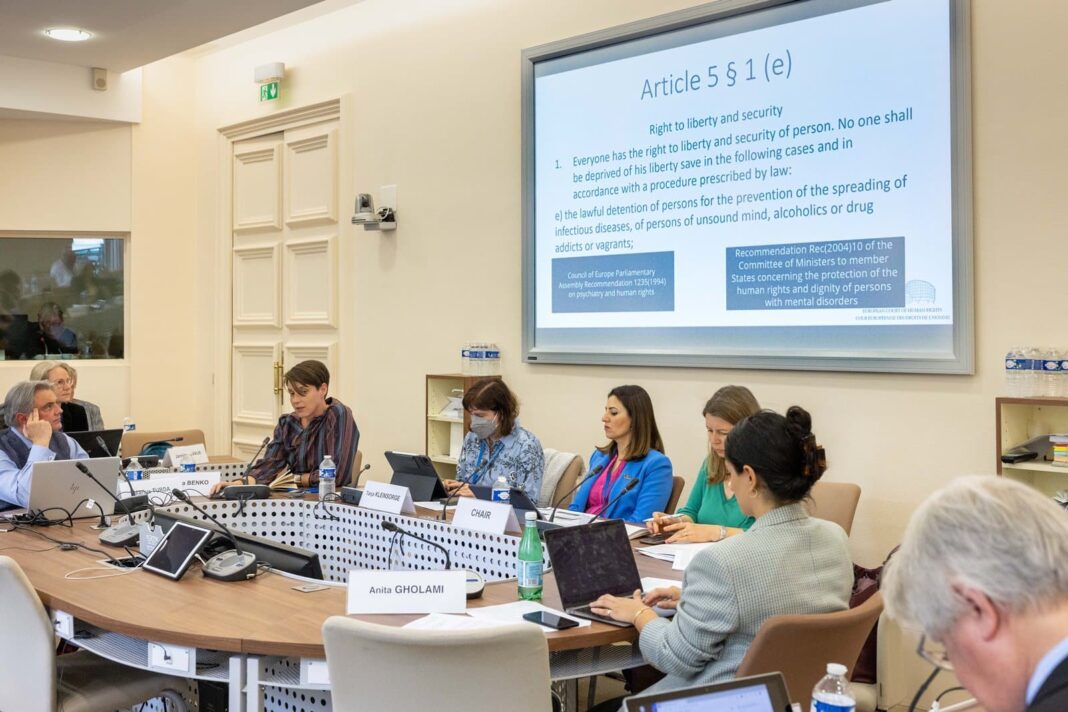The Parliamentary Assembly of the Council of Europe this week dived in to deeply rooted discrimination and rights issues, discussing core values on which the Council had been founded in 1950. Ongoing research is tracking down the roots to text in the part of the European Convention on Human Rights that delineate, but also limits the right to liberty and security of person.
The Parliamentary Assembly Committee in a motion approved in 2022 pointed out, that the European Convention on Human Rights (ECHR) is “the only international human rights treaty to include a limitation to the right to liberty specifically on the basis of impairment, with its formulation in Article 5 (1) (e), which excludes certain groups (“socially maladjusted” individuals in the wording of the European Court of Human Rights) from the full enjoyment of the right to liberty.”
As part of the research in to this the Assembly’s Committee on Social Affairs, Health and Sustainable Development Monday held a hearing with experts to learn more and further discuss the matter. Experts presented data to the Committee’s members and were being questioned on these.
Hearing with Experts

Prof. Dr. Marius Turda, Director of the Centre for Medical Humanities, Oxford Brookes University, UK described the historical context in which the European Convention on Human Rights had been formulated. An expert on the history of eugenics, he pointed out that eugenics first appeared in the 1880s in England and since spread fast and wide and became a global phenomenon within a couple of decades.
To really understand this phenomenon, one has to understand that the main purpose of eugenics “was to ‘improve’ the genetic ‘quality’ of the human population through the control of reproduction and, at its extremes, through the elimination of those who were considered to be ‘unfit’, physically and/or mentally.”
“From the very beginning the eugenicists argued that society needed to be protected from the growing numbers of those they labelled ‘unfit’, ‘maladjusted’, ‘unsound of mind’, ‘feebleminded’, ‘dysgenic’ and ‘sub-normal’ due to their physical and mental disabilities. Theirs were eugenically marked bodies, labelled as such and stigmatised accordingly,” Prof. Turda noted.
Eugenics obviously achieved worldwide notoriety with the exposure of concentration camps of Nazi Germany in the 1940s. The Nazi in their efforts to apply biology had carried eugenics to the extreme. Yet, eugenics did not end with the defeat of Nazi Germany. Prof. Turda pointed out that “Eugenic proposals continued to attract political and scientific support after the end of World War II.”
The term “Unsound mind” used in the European Convention on Human Rights
In fact, the very notion of ‘unsound mind’ was re-scripted into the concept of ‘maladjustment’ in the post-war years, and then applied more broadly to perpetuate the eugenic stigmatisation of various social identities.
“The link between mental disability and social unfitness remained unchallenged. To be sure, the growing influence of environmental and social factors on the development of human behaviour reoriented the language of eugenics; but its main premises, as expressed through both normalizing discourses about social efficiency as well as legal practices centred on the control of reproduction, continued in the post-war period,” Prof. Turda indicated.
Historically, the concept of ‘unsound mind’ – in all its permutations – played a significant role in shaping eugenic thinking and practice, and not only in Britain.


Prof. Turda laid out that, “it was deployed in a variety of ways to stigmatise and dehumanise individuals and also to advance discriminatory practices and marginalisation of individuals with learning disabilities. Eugenic discourses as to what constituted normal/abnormal behaviours and attitudes were centrally framed around representations of mentally ‘fit’ and ‘unfit’ individuals, and ultimately led to significant new modes of social, economic, and political disenfranchisement and the erosion of rights for women and men labelled of ‘unsound mind’.”
It is in the light of this widespread acceptance of eugenics as an integral part of the social policy for population control that one has to view the efforts of the representatives of the United Kingdom, Denmark and Sweden in the process of formulating the European Convention of Human Rights suggested and included an exemption clause, that would authorize the government’s policy to segregate and lock up “persons of unsound mind, alcoholic or drug addicts and vagrants”.
Given this eugenic background, it is therefore highly problematic continue to use this expression in the Convention on Human Rights.
Prof. Dr. Marius Turda, Director of the Centre for Medical Humanities, Oxford Brookes University, UK
Prof. Turda concluded his presentation that “Given this eugenic background, it is therefore highly problematic continue to use this expression in the Convention on Human Rights.” And he added, “It is important that we pay attention to the words we use because language itself is used to maintain discrimination. For decades now this eugenic descriptor has remained unmarked and unquestioned. The time has come for a new look at this entire problem, and to confront the lingering adherence to eugenics after World War II.”











